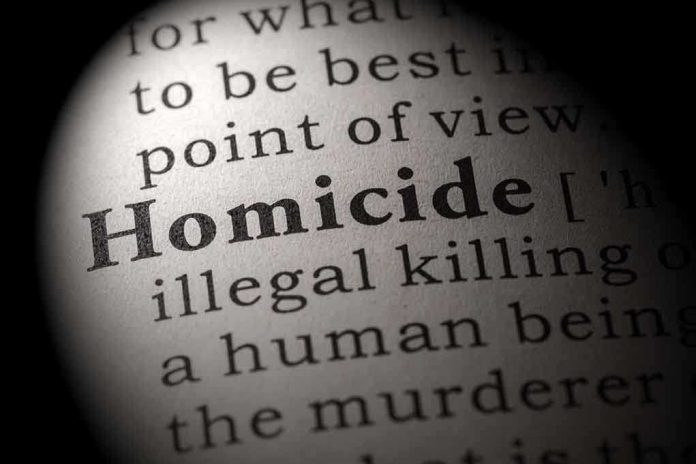
Gunmen opened fire at a Catholic festival in Irapuato, Mexico, slaughtering 11 people, including a teenager, exposing the government’s inability to control surging cartel violence that has turned even religious celebrations into killing fields.
Key Takeaways
- Eleven people were killed and at least 20 wounded during a Catholic festival in Irapuato, Mexico, including a 17-year-old boy, eight men, and two women.
- The massacre occurred during the celebration of the Nativity of St. John the Baptist, demonstrating cartels’ disregard for religious sanctuaries.
- Guanajuato state recorded over 3,000 homicides last year, the highest in Mexico, amid ongoing turf wars between the Santa Rosa de Lima gang and Jalisco New Generation cartel.
- Since 2006, cartel-related violence has resulted in over 480,000 deaths nationwide, with more than 120,000 people missing.
- Mexican President Claudia Sheinbaum condemned the attack as “deplorable” while promising a federal investigation that critics fear will yield little meaningful action.
Religious Celebration Turns to Bloodbath
What should have been a joyous religious festival in Irapuato, Guanajuato, instead became the latest scene of Mexico’s spiraling cartel violence. Armed assailants unleashed a barrage of bullets into crowds celebrating the Nativity of St. John the Baptist, killing 11 people and wounding at least 20 others. The victims included a 17-year-old boy, eight men, and two women who were participating in a traditional Catholic celebration deeply rooted in the region’s heritage. Footage from the scene shows terrified attendees running for their lives as gunfire erupted, with many Good Samaritans rushing to help the wounded.
Witnesses described scenes of chaos and desperation in the aftermath of the shooting. “It was chaos. People put the wounded into their cars and rushed to the hospital to try to save them,” said one witness at the scene, as reported by Al Jazeera. This brutal attack demonstrates the cartels’ complete disregard for human life, religious sanctity, and public gatherings. While authorities work to identify all the victims, families are left grieving losses that have become all too common in a state besieged by violence.
Cartel Violence Spiraling Out of Control
Guanajuato, once known primarily for its rich Catholic traditions and colonial architecture, has transformed into Mexico’s deadliest state. Last year alone, the region recorded over 3,000 homicides – the highest in the country. Local authorities attribute the massacre to “an ongoing turf war” between rival criminal organizations, according to LifeSiteNews. The primary conflict involves the Santa Rosa de Lima gang and the Jalisco New Generation cartel, both fighting for control of lucrative drug trafficking routes and other criminal enterprises.
“Deplorable” was how Mexican President Claudia Sheinbaum described the attack, promising a federal investigation into the massacre, according to LifeSiteNews. She further characterized the incident as a “confrontation,” though witnesses described it as a targeted attack on innocent civilians. The local government in Irapuato condemned the shooting as a “cowardly act” and vowed to pursue those responsible, while offering psychological support to affected families.
Mexico’s Failed Security Policies
This latest massacre is not an isolated incident but part of a disturbing pattern of violence plaguing Mexico. Since 2006, when the government launched its war against drug cartels, more than 480,000 people have been killed in cartel-related violence, with over 120,000 people missing. In Guanajuato alone, similar recent incidents include the murder of seven young men last month and eight young men in March, highlighting the government’s inability to protect its citizens from organized crime.
Governor Libia Dennise of Guanajuato has pledged justice and support for the victims’ families and survivors, but such promises ring hollow for many Mexicans who have seen decades of similar assurances with little improvement. The relentless violence in Mexico serves as a stark warning about the consequences of failed border policies and ineffective governance. While Mexican authorities struggle to contain the bloodshed, the violence continues to spill over into neighboring countries, including the United States, through drug trafficking, human smuggling, and the spread of cartel influence.
A Nation in Crisis
The Irapuato massacre represents more than just another statistic in Mexico’s ongoing violence – it symbolizes the profound crisis facing the nation. When even religious celebrations become targets for mass killings, the social fabric itself begins to unravel. Families are now afraid to attend public gatherings, churches are considering enhanced security measures, and communities live in perpetual fear. The psychological impact extends far beyond the immediate victims, creating generational trauma and eroding trust in institutions.
As investigations into the massacre continue, questions remain about whether meaningful action will follow or if this tragedy will simply join the long list of unsolved crimes in Mexico. With cartels growing increasingly bold in their attacks on public spaces, the Mexican government faces mounting pressure to implement effective security strategies. Until then, ordinary citizens remain caught in the crossfire of a seemingly endless war, with religious festivals, family gatherings, and everyday activities all potential settings for the next cartel-orchestrated bloodbath.







